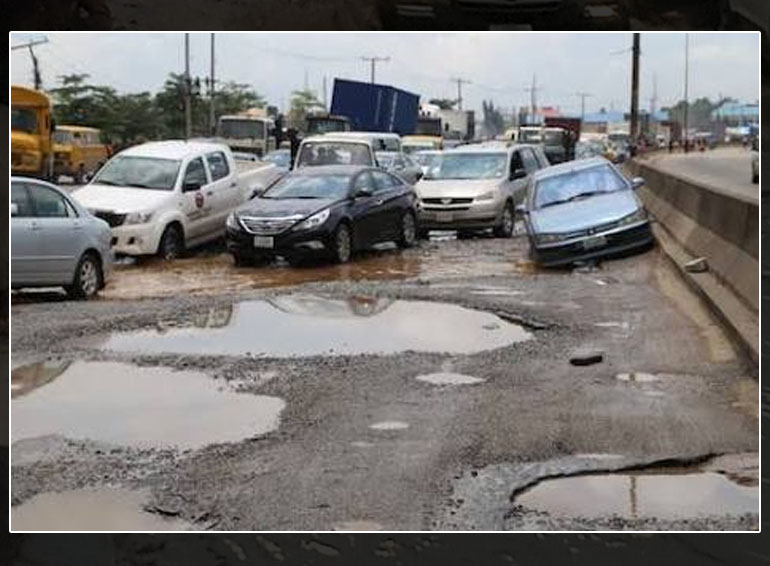Nigeria’s roads remain an untidy mess and its road infrastructure shortfall is critical. With a land mass of 923,768 square kilometres and a population of over 220 million (National Population Commission), its roads span just about 200,000km. About 63 per cent of this is un-tarred and most are decrepit. Commuters describe the roads variously as “death traps,” “deplorable,” or “dilapidated.” Umahi recently lamented that the potholes on federal highways had deteriorated into “boreholes.”
Table of Contents
The failure of successive governments in Nigeria to fix the death traps called roads in Nigeria has no doubt caused so much pain to temporal and frequent road users. The bad roads across the nation are nothing to write home about. Government at all levels must be alive to their responsibilities to make sure all roads in Nigeria are safe and motorable.
Poor road conditions could not only contribute to a hollow journey. Roads may deteriorate to the extent of risk. This involves potholes, rough road conditions, cracked asphalt and exposed rebars. If a car hits a big pothole, the tyre could burst into another lane and crash into another car. Uneven road surfaces can cause a driver to lose control of their vehicle, leading to a crash or rollover accident injuring the driver, passengers, and pedestrians.
BAD ROADS: This refers to when a road is not maintained well and is kept in bad condition.
There are two types of roads: Metalled (hard-surfaced) and unmetalled roads. Metalled roadways are made to sustain vehicular load and so are usually made on frequently used roads. Unmetalled roads, also known as gravel roads or dirt roads, are rough and can sustain less weight. Road surfaces are frequently marked to guide traffic.
Causes of Bad Roads
The causes of road failures in Nigeria include a lack of careful and diligent geotechnical studies, inadequate knowledge of geology, old age, inadequate maintenance, poor design and construction, lack of drainage, use of poor and substandard materials, and heavy traffic
1. Other factors contributing to road failures are lack of laboratory investigation of construction materials, poor quality of construction materials, poor soil condition, inadequate drainage systems, and overloading of road.
2. Additionally, the quality of subgrade materials, such as moisture content, liquid limit, plastic limit, compaction, California bearing ratio, and shear strength, can impact road pavement failure.
3. Low road density, stress, functional disability, loss of cohesion, and lack of cambering tests are also contributing factors to road failures in Nigeria.
Effects of Bad Roads on Nigeria Car Consumers
Failure along Nigerian roads affects both the road users and the vehicles . Some of the effects identified are:
- Increased accident rate
- Increase in faulty vehicles
- high vehicle maintenance cost
- Increase in travel time either due to traffic congestion or due to bad nature of road section.
- Insecurity posed by criminals at failed sections of roads,
- Risk of flooding and erosion
- Adverse effect on economic development
Signs of Bad Roads Failure
As identified by Ndefo (2012) signs of bad road Failures includes: Potholes and Cracks, Depression on road surface, Development of Gully due to erosion, failed road shoulders, Faulty Drainage, Faulty Traffic signals and Street lights and Wiping off of Lane markings .Ndefo (2012) opined that most Nigerian roads are non- functioning according to the standard of a safe road.
Effects of Bad/Rough Roads on Cars
The information below captures a summary explanation of how some major systems of an average vehicle worsen when exposed to Bad/rough roads.
Alignment: Rough roads can easily affect a car’s alignment. Your vehicle’s alignment is not only an important key to its quality of drivability and safety but also to the life of your tyres.
Tyres: Obviously, your tyres take the brunt of the damage from driving on rough roads. And we all know the damage a pothole can do to a perfectly good tyre. If your alignment is off, then that affects the way your tyres wear and significantly reduces their lifespans. One tyre may begin to wear more than the others, therefore, increasing the chances of a flat tyre or even a blowout.
Suspension: Your vehicle’s suspension system is responsible for your car’s ability to balance. However, consistently driving on roads in poor conditions can really wear on the suspension. If there is a problem with your suspension, you may notice that your car bounces or sways more than usual and could be hard to control or steer, even at low speeds.
How to deal with bad roads
When driving on poor roads, maintain a steady speed, grip the steering wheel firmly, and avoid sudden maneuvers or aggressive braking. Slow down when necessary, keep a safe distance from other vehicles, and anticipate potential hazards like potholes or debris to navigate safely.
Lack of maintenance of roads in Nigeria has become a public issue as Nigerians are daily lamenting this failure of leadership. Good roads are a basic component of good governance. Nigerians are routinely being put at risk everyday as a result of the failure of the state to provide adequate amenities for its citizens. All the authorities involved in road construction and maintenance should buckle down and do something to remove this blot on Nigeria ‘s image.
Have 1 million naira and above to Buy or Sell Cars In Nigeria? Check carlots.ng
All rights reserved. Reproduction, publication, broadcasting, rewriting, or redistribution of this material and other digital content on carmart.ng is strictly prohibited without prior express written permission from Carmart Nigeria - Contact: [email protected]







